Why Eddie Woo used Australia Day to bring us altogether
CHERRYBROOK Technology High School’s celebrated mathematics teacher Eddie Woo delivered a powerful Australia Day address earlier this week. Read it here.
Hornsby
Don't miss out on the headlines from Hornsby. Followed categories will be added to My News.
CHERRYBROOK Technology High School’s celebrated mathematics teacher Eddie Woo delivered a powerful Australia Day address on Tuesday.
The NSW Local Hero recipient said he overcame harassment and isolation “for not being Australian” to finally realising he was a fair dinkum Aussie.
The Baulkham Hills resident spoke about why his dad left Malaysia, listening to Crowded House, bullying at school, supporting the Parramatta Eels and world turmoil over the past 18 months, using bits of humour to drive his amazing message home.
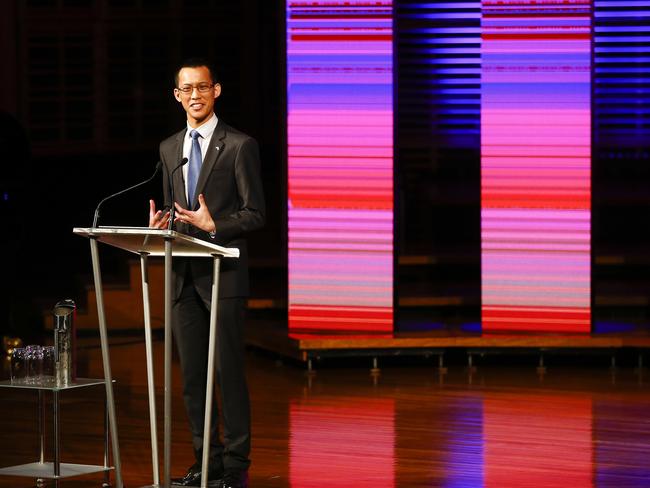
He spoke about his love for maths — admitting it was not his first choice, which was to be a firefighter — saying the subject should be embraced by everyone.
Mr Woo said he felt devastated — as a father and teacher — of the tragic death of two children at Banksia Road Public School, Greenacre, last year.
Mr Woo told the audience at the Sydney Conservatorium of Music on Tuesday that his parents “didn’t just want us to live here; they wanted us to belong here”.
“This was part of what made the everyday racism that I grew up with so frustrating,” he said.
“It wasn’t the intimidation, or the mocking, or the loneliness that really bothered me — so much as it was my inability to understand what people wanted that would satisfy them and make them stop.”
Mr Woo spoke of the sacrifices many teachers made to ensure their students were protected and nurtured.
He started a Wootube channel in 2012 to ensure a student who had cancer did not miss lessons. It has since amassed more than 100,000 subscribers and over eight million views.
“Being a lover of English and history is why I know that mathematics can help us appreciate and understand the world more deeply and richly than any of us ever imagined,” he said.
“Being a Christian is why I know that serving others through self-sacrifice is always, always worth the cost.
“ ... These are lessons from my story. Yours will be different and that’s why we need to hear each other’s.”
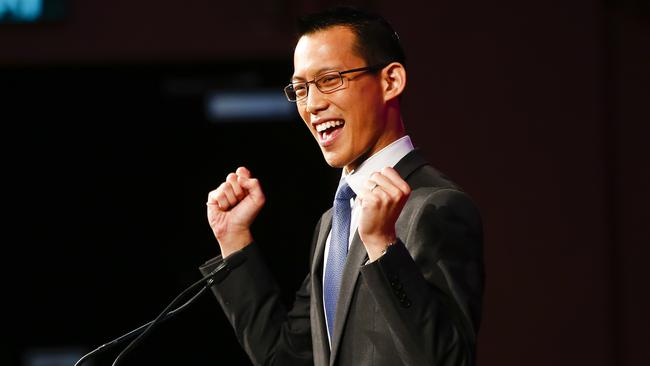
READ EDDIE WOO’S INSPIRING SPEECH
His Excellency the Governor of New South Wales and Mrs Hurley — the Honourable Gladys Berejiklian, Premier of New South Wales — Chairman and board members of the Australia Day Council of NSW, distinguished guests, ladies and gentlemen.
It’s a great privilege and joy to stand on the land cared for by the Gadigal people of the Eora nation. I want to recognise and honour the elders, past and present, of this beautiful country that we call home and celebrate today. Thank you for stewarding this wonderful place and making it an environment we can all enjoy and cherish together, both in our everyday lives and in special times like this.
The theme of Australia Day this year is Everyone, Every Story. It’s a strange honour to have been invited to give this address and share my story with you. It’s obviously an honour to stand in this amazing tradition, following so many incredible individuals — and to be tasked with giving you a spoken celebration of what it means to be Australian is a unique and special gift.Being a teacher gives me the opportunity to see and savour the very best of what Australia is. I get to see students dream of what they might one day become and achieve. I see them aspire to cure disease, to tackle climate change and fight for the rights of the disenfranchised. I get to watch them grow into pastry chefs, engineers, nurses and even fellow educators — citizens who will make a positive difference in Australian society.
And what makes it all the more meaningful is that I see students make and reach these goals in the nitty gritty mess of everyday life. I get to see my students face and overcome enormous challenges: from severe learning needs to socio-economic disadvantage, from broken families and domestic violence to substance addiction. I have the weighty privilege of seeing not just my students but entire school communities respond with care, integrity and kindness in some of the most harrowing circumstances.
I think back to the terrible tragedy at Banksia Road Public School in November last year when two students died in a car crash accident. Those two boys were in Year 3 — the same year as my daughter — and I know I’m not the only one for whom that awful incident struck so very close to home.
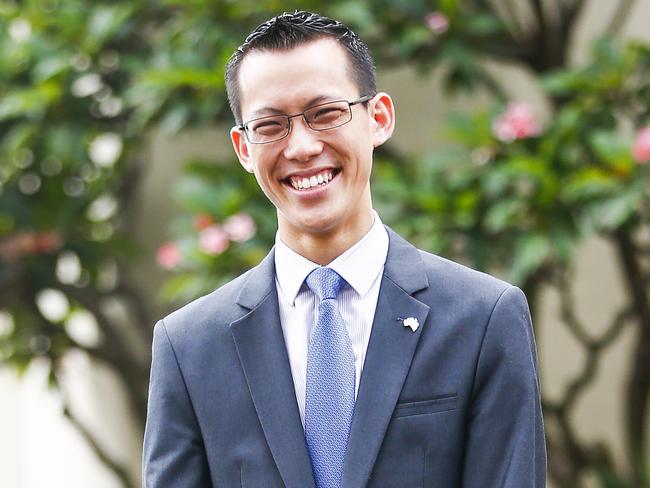
As time wore on, though, what became increasingly clear amid all that unimaginable grief was the profound outpouring of love, sympathy and service that centred on that school. I remember my feeling of surprise when I heard that the school was going to reopen the very next day. And then I read what was said by our Secretary, Mark Scott: “The strong view of the principal and the school community was the school is so vital as part of the healing process. It’s where students are going to want to come. It’s where community members are going to want to come.” As a teacher, I get to see those great Australian qualities of courage, compassion and mateship in action every day.
Strange for me
So it’s wonderful to have the honour of celebrating that. But it’s also strange for me to be the one standing here today, being a person who grew up harassed and isolated for not being Australian. When I was a kid, it didn’t seem to matter that I was born in Camperdown, or that I spent my entire childhood in North Rocks supporting the Parramatta Eels. It didn’t seem to matter that I grew up listening to Crowded House, or that my favourite food was the potato scallop I religiously purchased for 20 cents at the tuck shop on my walk home from school each day.
No, what seemed to matter was that I didn’t look Australian — or at least that I didn’t fit what my peers thought an Australian was supposed to look like — so I grew up thinking of Australians as other people. It took me many years to not just realise I was genuinely Australian but to feel that I was — and then it took me several more years to see how being Australian has fundamentally shaped me as a person. And that conviction has somehow led me here, to stand before you today.
I believe one of the defining characteristics of Australian society is that we seek to offer a world class learning environment to every child in every school. Whenever I speak with teaching colleagues from around the world, it fills me with pride to describe the way our schools labour to accommodate everyone who walks in the door. This is actually the reason why my brother, sister and I are Australians in the first place.
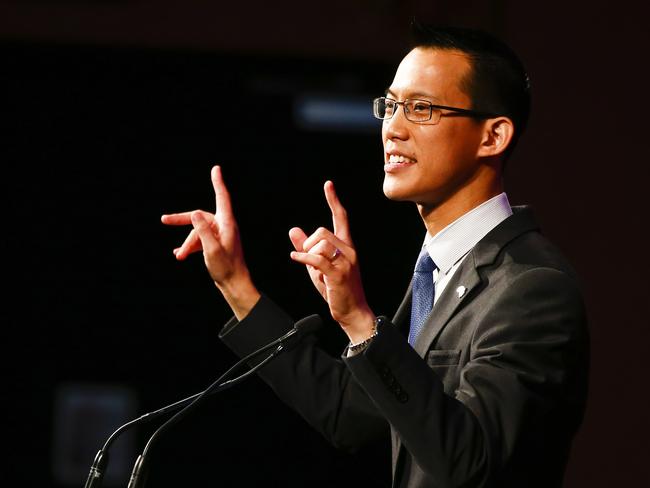
For the three of us, being Australian wasn’t just a coincidence of birth location. It was a very deliberate choice from my father who left his birthplace of Malaysia because its education system didn’t favour someone with his Chinese heritage. He did his matriculation in Melbourne, studied to become a tax accountant at the Australian National University, and when the time came to raise a family, remaining in Australia seemed the obvious choice. It was so clear, in fact, that Mum and Dad made their commitment visible in our names. Anglo-Saxon first names; Anglo-Saxon middle names.
To belong here
Mum and Dad raised us with English as our first language because they wanted us to grow up without accents and all the related challenges that had come with them when they first moved here. They didn’t just want us to live here; they wanted us to belong here.
This was part of what made the everyday racism that I grew up with so frustrating. It wasn’t the intimidation, or the mocking, or the loneliness that really bothered me — so much as it was my inability to understand what people wanted that would satisfy them and make them stop.
I dreaded every morning because I knew I’d have to get ready for school and I knew what was waiting for me. I became what as a teacher I would now call a “school refuser”: there were days when I willed myself to stay in bed and hoped that my mum would give up on trying to get me to school because it was too late.
Poor mum was then stuck with me as she went about her errands. Sometimes, in an effort to cheer me up and encourage me to attend school the next day, she’d buy me a book — I would collect little puzzle books and “choose your own adventure” paperbacks — and for a few hours I would lose myself in another world and become a hero instead of a loser. I loved those books so much — and apparently I made that too obvious because when I returned to school, it didn’t take long for my bullies to find my treasured belongings in my bag and steal them. I’d always find them eventually, ripped to pieces and scattered across the playground, another symbol of how poorly I fit in.
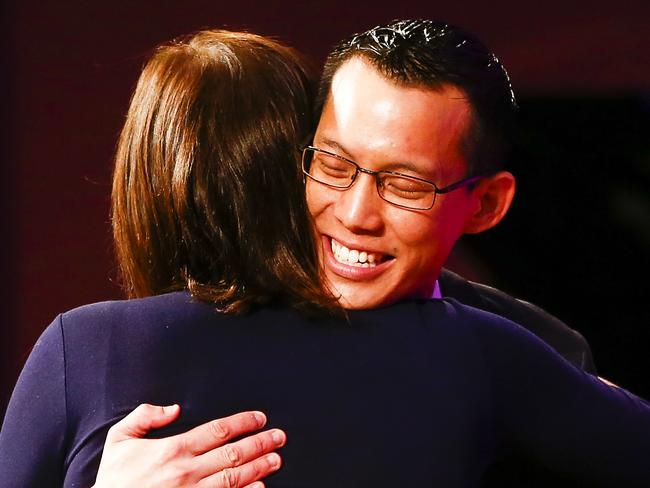
Didn’t belong
In time, I learned that there was nothing I could do to stop others viewing me as someone who didn’t belong. But I think, deep down, my parents understood that it was worth playing the long game on this one. That their sacrifices in coming here, and our sacrifices in staying here, would be worth it. That the access to schools and universities, the access to a better life than the one they left behind, would be worth the price we paid. They hoped that we would have opportunities and freedom to make choices like they never could.
But that was where the next challenge came up. My brother used that freedom to enter the IT industry right as the dotcom boom swept the globe. My sister chose to become a dentist, the first “doctor” in the entire Woo dynasty.
I gained entry into an academically competitive selective high school and it looked like everything was on track for a perfect three children out of three who would make it into a lucrative and socially respectable profession. The migrant’s dream come true. No one saw what was coming next: I discovered that I wanted to be a teacher.
In the fifteen years since I made this discovery, many people have questioned me on this decision. An old friend once put it to me like this: “Every year you teach the same syllabus, every day you march to the same bell times. You leave school exhausted, mark papers and write reports all night till you fall asleep, then an alarm jolts you awake and you do it all over again. It’s like Groundhog Day with teenagers.
Why would you do this to yourself?”
Wanted to be a firefighter
I didn’t always want to teach. Like many young boys I’d wanted to be a firefighter. Sadly, I found out that having chronic asthma didn’t exactly place me at the top of the eligibility list.
I thought I’d follow my brother into IT, but in the middle of my high school years the dotcom bubble burst. I pictured myself completing university with a useless piece of paper in my hands. Then all at once, through being an army cadet, a prefect, a leader in my school’s Christian group and a peer support mentor to Year 7 students as they entered high school, I realised that I loved helping people learn.
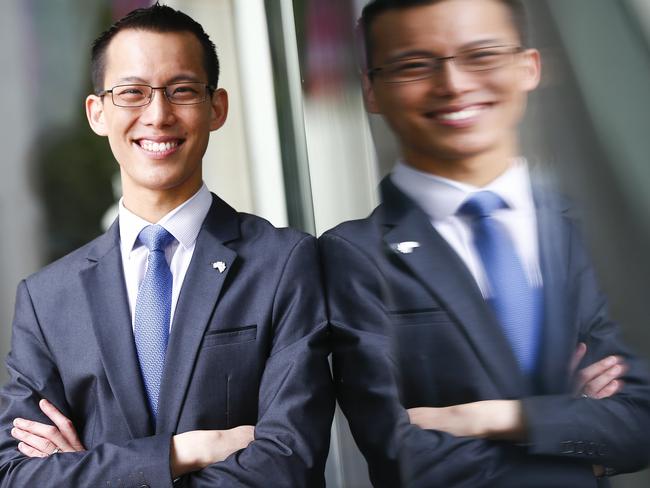
Seeing them grow — in their knowledge and skill, in their understanding of the world and in their realisation of what they themselves were capable of — was an immense source of joy that’s still the reason why I love teaching today.
Teaching’s more than just a source of joy for me, though. It’s also a source of moral purpose. The last 18 months have been a powerful reminder of how important education is to our world. If the Trump presidency, Brexit and our own recent political conversations have taught us anything, it’s that while we live in an age where we hear more information than ever, we haven’t learned to listen to those around us and appreciate points of view other than our own.
Like every year before it, 2017 was littered with political debates. But this year something was different.
Though each of the examples I mentioned earlier was certainly a landmark decision, the most striking thing about this most recent season wasn’t purely the outcomes. No, for me the most striking thing has been our consistent failure to open dialogue and form a nuanced understanding of others across political and ideological lines. In the US, the UK and here in Australia we’ve shown that while we live in structurally democratic societies, we’ve struggled to cultivate personally democratic relationships.
Instead of using social media to connect with those who have different perspectives to us, we’ve created echo chambers where we hear precisely those views that affirm our own beliefs and denigrate those of others.
Informational slavery
I’ll openly admit that my generation is the worst at this. Instead of seeking multiple independent reports about current affairs, we submit ourselves to the yoke of informational slavery that comes from consuming a curated news feed. We scroll and swipe our way through whatever’s received the most likes and shares with little care for its journalistic integrity. This simplistic approach toward understanding the world has begotten a simplistic approach toward relating to others.
While my generation is the poorer for it, we’re not the only ones. Anyone who reads news from just one paper or hears reports from a single radio station renders themselves equally subject to the biases of whoever has their ear. And we all suffer for it. We suffer in the way that it makes us judge our neighbours who dress differently, who vote differently, who speak differently. We suffer in the way that we ourselves are judged, just like I was judged and bullied as a child.
But this cycle can be broken. And if it is, then education will be at the heart of how it happens. This is why, through a life of fighting discrimination and government-sanctioned oppression, the late Nelson Mandela declared: “Education is the most powerful weapon which we can use to change the world.” How can this be? Well, my school is a perfect example. Almost 2000 children.
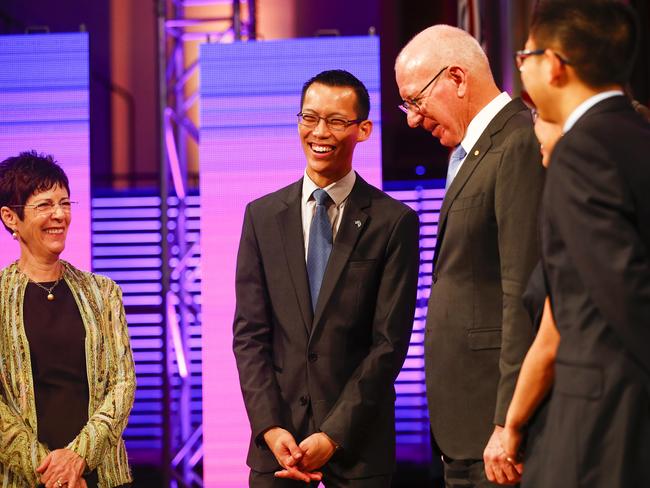
More than 60 cultures and languages. Our school motto is: Achieving Together. Our students form their identities in the context of grappling with different accents, different values and different ways of thinking. Our students grow as citizens while learning every day to suspend their instinct to judge by appearances. Our students’ daily experience is that strength is found in working hand-in-hand with those who are different to us, appreciating the things that unify us without diminishing the qualities that distinguish us.
Fashioning citizens
This is just one aspect of why teaching is so filled with purpose for me. School is about so much more than learning facts; it’s about fashioning citizens and giving them a passion to make the world a better place. As the ancient Greek writer Plutarch put it, “education is not the filling of a pail, but the lighting of a fire”.
That’s why I teach. But the next question that people usually ask me is: why maths? The truth is, I never planned to teach this subject. My Higher School Certificate was stacked towards the humanities: I took Drama, Modern History, History Extension and English Extension 2.
So when I turned up at the University of Sydney, it seemed natural for me to write on my enrolment form: Bachelor of Education, Secondary, majoring in English and History.
What I didn’t count on was one of the Faculty of Education professors at the time, who was walking up and down the queue of new students. He came to me, and without so much as saying hello, plucked the academic transcript out of my hand
. He looked it up and down, and seeing that I’d done a reasonable amount of mathematics at school, told me on the spot that I should consider becoming a mathematics teacher. Then he spent the next 20 minutes convincing me about Australia’s critical shortage of skilled, passionate mathematics teachers and how desperately we needed people to take up their mantle.
A day in the life of maths teacher and Youtube star Eddie Woo
There’s an old joke that primary teachers go into teaching because they love kids, secondary teachers go into it because they love their subject and tertiary teachers go into it because they love themselves. Maybe that means that deep down I’m a primary school teacher, because the thing that drew me to education in the beginning was the desire to work with children and help them flourish. It didn’t matter to me so much what subject I would teach. I just wanted to be useful.
And that’s how I found myself preparing to teach mathematics. But while I was at university studying my mathematics degree, a funny thing happened. I discovered what mathematics actually was. I’d always struggled with mathematics in high school. It never came easily to me and I realise now it’s because I fundamentally misunderstood it.
To teenage me, mathematics was about memorising arcane rules I didn’t comprehend to solve contrived problems that I didn’t care about. It was about getting answers, and getting them quickly. But in university, I started to learn that mathematics is less about finding answers fast and more about slowing down to ask the right questions. I learned that mathematics is not about mindlessly stepping through algorithms, but rather about imagining new ways to see problems so they can be solved with creative and unexpected techniques.
Abstract pursuit
I began to understand that far from being an abstract pursuit reserved for those in ivory towers, mathematics is woven into absolutely every aspect of our lives — from the patterns of nature all around us to the structures on which we’ve built all of human society. The beautiful spiral of seeds on the face of a sunflower.
The pristine crystalline symmetry of a snowflake. The millions of perfectly hexagonal cells flawlessly crafted by the world’s greatest civil engineers in beehives around the planet. The enormous prime numbers that keep your credit cards safe online. The reason why when you microwave your lunch, half of it burns your mouth while the other half is still icy cold! All of it is mathematics.
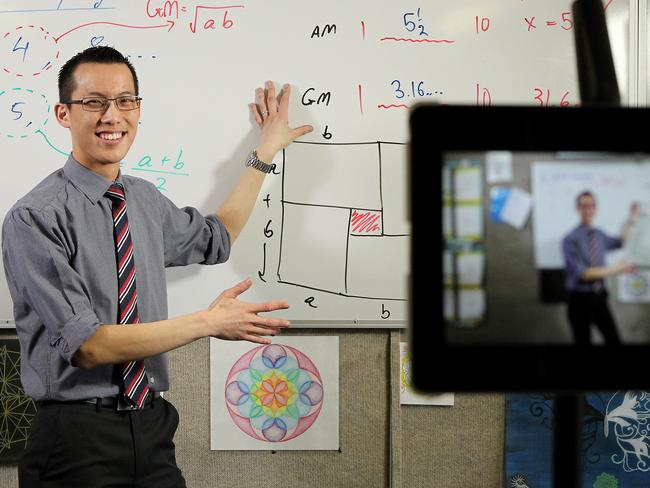
So, I started to appreciate why mathematics finds its way into everything. It’s because mathematics is about far more than just numbers. It’s about patterns and relationships. It’s about the logic that animates the universe and the connections between everything around us. And because mathematicians speak in patterns, we’re uniquely positioned to recognise the common realities hiding underneath things that seem completely different on the outside.
Have you ever noticed that lightning bolts, river deltas, sprawling gum trees and the network of blood vessels running through your body all have the same characteristic shape that starts from a central line and splits off into ever-smaller branches? Every single one of them belongs to the same mathematical family — we mathematicians call them fractals.
You see, poetry is the art of calling the same thing by different names. But mathematics is the art of calling different things by the same name. It takes a mathematician to see such different objects — rivers, trees, arteries — and recognise that they’re all related, that they all share the same DNA.
This power of mathematics has unlocked the mysteries of the cosmos. As Galileo said, “Mathematics is the language with which God has written the universe.” It’s enabled us to perceive the curvature of space-time and the microscopic structures of the quantum realm. But the thing I want to highlight for you in closing is the way that, just as mathematics has scientific power, mathematics has social power.
One of my favourite things I’ve done as a high school teacher is be a touch football coach. You can probably tell that I’ve never been an especially athletic person, so I relished the opportunity to vicariously live out my sporting dreams through the teams I used to coach. But the reason I loved coaching touch football was not because of the sport itself. It was nothing to do with the tries or the passes or the clever strategies.
It was all about the kind of people my students became when they played. They became disciplined. They learned to rely on each other. They came to appreciate the diverse strengths of their teammates. By playing this sport, each player became a different person and their character would grow.
Plenty to love about mathematics
This is the same reason why I’m a mathematics teacher. The main thing I love about teaching mathematics to my students isn’t the subject itself, though there’s plenty to love about it. The main thing I love is that through learning mathematics, each student becomes a different person and their character grows. They learn to persevere through difficulty when an answer isn’t obvious. They develop clarity of thought and the ability to argue logically. And most importantly, they learn to see from different perspectives.
You see, mathematicians are like jewellers. We treat every object like a diamond because we know that looking at it from just a slightly different angle will reveal a whole new kaleidoscope of colours and faces. This is what I do in my classroom every day. We take a single idea and we examine it algebraically. Then we graph it and consider it visually. Then we deconstruct it into its trigonometric components. Then we express it as a polynomial and we work on it with calculus. Every time we take a new perspective we learn something new.
This is how mathematical knowledge advances.
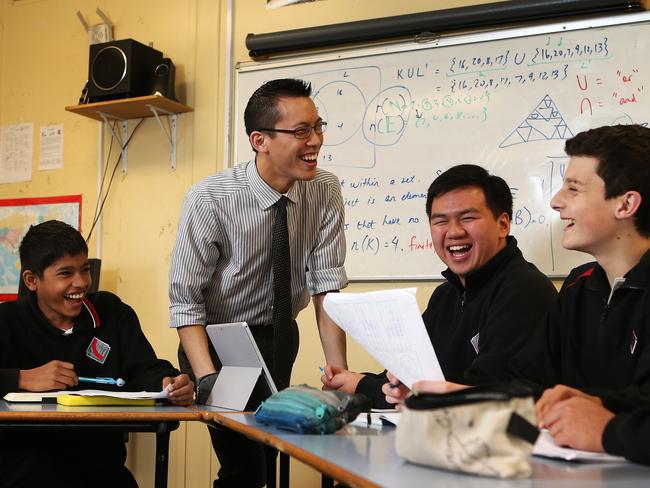
And unlike in any other field of knowledge, once we prove something is true mathematically, it’s true forever. Mathematics is never revised or refined in terms of new evidence. It never needs to be because mathematical reality is timeless in its truth and beauty. It’s why the oldest names we study in school — Pythagoras and Euclid — are mathematicians, because the theorems they articulated are as true now as they were the day were discovered. In an age where postmodern relativism has gone mad, where fake news and alternative facts spread far and wide, I think we could all do with a good dose of rock solid provable truth.
To conclude, there are three messages that I’d like you to take away and contemplate as we celebrate our nation this Friday.
Firstly, this Australia Day I invite all of you to be mathematicians. Don’t run for the hills yet! Let me explain what I mean. Mathematics has enabled us to design machines at subatomic scales. It’s the backbone of artificial intelligence that can play chess, drive cars and identify cancers far better than humans ever could. But the thing I feel most strongly about, more than all the futuristic technology, is how mathematics can make us more human. You can be a mathematician by learning to see things from a new perspective.
When you do that with a fellow human being, we call it empathy. You can be a mathematician by being curious about patterns. Think about your community and ask the tough questions about why the social patterns around us exist and how we can change them for the better. When you look at people who seem so different throughout our country, who look different and sound different and believe different things — you can be a mathematician by looking at different people and yet calling them all by the same name: Australians.
Passionate about following need
Secondly, there’s something I want to emphasise to the current generation of young people.
So many of the stories you hear and the films you watch tell you that if you want to find fulfilment, then you need to listen to your heart and follow your passion. But I don’t buy that. I didn’t come out of high school passionate about mathematics — quite the opposite! If you’re a young person trying to find your way in the world, I don’t think you need to follow your passion. I think you have to become passionate about following need. Seeing a need is what set me on the path of teaching mathematics. Seeing a need is what led me to start filming my classroom lessons five years ago and putting them on the internet.
Fulfilment isn’t found in looking into yourself, it’s found in looking to others and having a heart to serve them with the gifts that you’ve been given. This is one of the things I love best about teaching: every child is gifted. I get the joy of discovering how they’re gifted and helping them learn to use their gifts. That’s why I’m passionate about what I do. Passion isn’t something we follow, passion is something we form, over time, as we discover what matters in our world and how we can make an impact on it.
Third and lastly, let’s learn to truly value our schools and our teachers. Education’s been one of Australia’s greatest assets, but things won’t stay that way unless we give educators the cultural and capital support that they need to do their jobs. For instance, that shortage of mathematics teachers I was telling you about has only become more severe since my university days. As a field, education struggles to attract students with a lifelong passion to change the world for good — and it’s even more of a challenge to keep them there, with almost half of our early career teachers leaving the profession in their first five years. They want a job with better work-life balance and much more respect from society, and who can blame them? Australian teachers are undervalued and overworked, so only those who are willing to make the sacrifices stay.
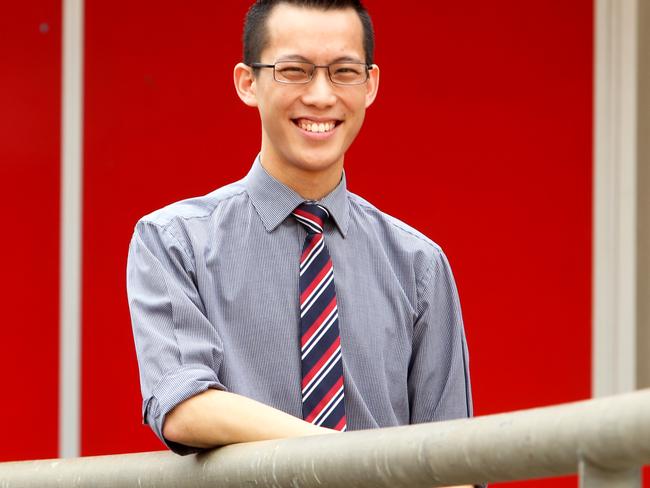
More about trust and respect
That needs to change. Valuing education isn’t about awards and accolades. It’s much more about trust and respect. Parents, politicians, managers and the media — we all must play our part in honouring our schools and those who work in them.
How do we do this? We just need to open our eyes to the everyday heroism happening all around our great country. Australia Day is a time to sit up and marvel at the wonderful acts of selflessness and sacrifice that go unnoticed around us each day. As I mentioned before, working in a school gives me a vantage point to so much of this care and dedication. I know teachers who run early morning breakfast clubs because they know that’s the only way many of their students can start the day with a square meal.
I know a man who moved more than 500km east of Kalgoorlie because he knows that the tiny indigenous community where he’s a principal can achieve learning outcomes as high as anyone else in the country. I know two of my own colleagues at Cherrybrook who spent a whole year training with a group of at-risk teenage boys to take them on a 24-hour 50km endurance hike.
They did it to raise funds for the children of fallen Australian soldiers, to give them a sense of camaraderie, to help them understand they’re more than just troublemakers, and to show them what can be achieved when they work together for the sake of others.
These stories are everywhere
These are the stories unfolding in schools around Australia that show what we are made of as a people. And these stories are everywhere. They’re over your back fence and beside you on the train. Everyone has one, and everyone’s story is worth learning from. I hope over the last half an hour you’ve learned from mine.
Being a teacher is why I know that regardless of who they are or where they live, all children can flourish in this ever-changing world if they receive a great education.
Being a lover of English and history is why I know that mathematics can help us appreciate and understand the world more deeply and richly than any of us ever imagined.
Being a Christian is why I know that serving others through self-sacrifice is always, always worth the cost.
Being an Asian and the son of migrants is why I know that hard work and perseverance are more important than talent.
And being an Australian is why I know that all of those qualities are worth valuing and paying forward to the community that I’m so proud to be a part of.
These are lessons from my story. Yours will be different and that’s why we need to hear each other’s. As you celebrate Australia Day, commit yourself to discovering someone’s story and appreciating their unique contribution to our country.
Happy Australia Day.


